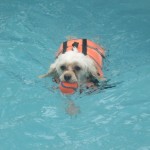Dogs are great companions, but if allowed in your pool, they can sometimes contaminate the water and spread germs that cause disease. It is important to always keep your pool clean and take precautions when any animals have been in or near the pool. And dog hair can accumulate in the skimmer basket and filter cartridge affecting flow of water and preventing proper filtration.
Some people also think that swimming is a skill that all dogs naturally have. Why would they call it the “doggie paddle” unless it was something all canines could do? But swimming isn’t necessarily an innate ability for dogs. And, yes, dogs do drown. Be sure your dog does not swim to the point of exhaustion and be sure he/she knows the way out of the pool.
 Swimming does seem to be a favorite sport for many dogs, even in the family pool! It is a great way to exercise your dog and is a non-weight bearing activity that reduces strain on the joints. However, dogs who swim in pools may have dry, itchy skin and irritated eyes due to the effect of chlorine and other chemicals in the water. Swimming dogs are also at increased risk of ear infections because water in the ear canals produces a perfect environment for bacterial growth.
Swimming does seem to be a favorite sport for many dogs, even in the family pool! It is a great way to exercise your dog and is a non-weight bearing activity that reduces strain on the joints. However, dogs who swim in pools may have dry, itchy skin and irritated eyes due to the effect of chlorine and other chemicals in the water. Swimming dogs are also at increased risk of ear infections because water in the ear canals produces a perfect environment for bacterial growth.
After a swim, rinse your dog thoroughly with fresh water and dry him/her. Clean and dry his/her ears throughly and use a gentle ear cleaner weekly. Products are available at your local pet supply to rinse eyes, dry out “swimmer’s ear” and prevent infection. Have fresh water and shade available for your tired dog to rest after swimming.
